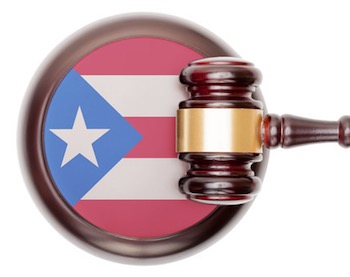 What do Nome, Alaska and San Juan, Puerto Rico have in common? For one thing, they are both home to a federal courthouse where, ostensibly, under the recent Acorda Therapeutics holding and subsequent court decisions, a generic pharmaceutical company will be subject to personal jurisdiction if they file an Abbreviated New Drug Application (ANDA) with the Food and Drug Administration (FDA). In Acorda Therapeutics, Inc. v. Mylan Pharmaceuticals, Inc., 817 F.3d 755 (Fed. Cir. 2016), the Federal Circuit held that an ANDA filer opens themselves up to nationwide personal jurisdiction merely by virtue of filing an ANDA application. This is a broad holding that, in effect, subjects a generic company to personal jurisdiction in any forum that has a district court.
What do Nome, Alaska and San Juan, Puerto Rico have in common? For one thing, they are both home to a federal courthouse where, ostensibly, under the recent Acorda Therapeutics holding and subsequent court decisions, a generic pharmaceutical company will be subject to personal jurisdiction if they file an Abbreviated New Drug Application (ANDA) with the Food and Drug Administration (FDA). In Acorda Therapeutics, Inc. v. Mylan Pharmaceuticals, Inc., 817 F.3d 755 (Fed. Cir. 2016), the Federal Circuit held that an ANDA filer opens themselves up to nationwide personal jurisdiction merely by virtue of filing an ANDA application. This is a broad holding that, in effect, subjects a generic company to personal jurisdiction in any forum that has a district court.
The reasoning behind the court’s decision in Acorda was that the ANDA filer is demonstrating intent to sell the drug nationwide by filing the ANDA due to the “economic realities of preparing an ANDA.” Id. at 761. Specifically, the “magnitude and costs of the work required before the ANDA is filed soundly link the ANDA filing to the filer’s entry in to the market to compete with the brand-name manufacturer if approval is obtained.” Id. In the months since Acorda, a handful of ANDA cases have addressed the issue of personal jurisdiction over the ANDA filer and all of them followed Acorda and found personal jurisdiction over the generic pharmaceutical company on the basis of filing an ANDA alone.[i] Further, none of these cases were able to defeat personal jurisdiction by arguing that the exercise of personal jurisdiction was “unreasonable” or unfair. It seems that Acorda has thrown open the door for brand name pharmaceutical companies to engage in gamesmanship when selecting the forum for their lawsuit—particularly if they are facing a small generic company.
So, is Nome getting ready for big pharma to come to town? Perhaps not. In the months since Acorda, there have been no paragraph 4 ANDA lawsuits filed in Nome or any other far-flung district courts. Rather, the paragraph 4 ANDA cases that addressed personal jurisdiction were filed in the usual districts: Delaware, the Eastern District of Texas, and New Jersey. Although there may be an advantage in driving up the cost of litigation by bringing it in a forum that is obviously inconvenient to the defendant, no brand company has taken that advantage yet. There are a multitude of possible reasons for this: the expertise of the courts, trusted local counsel, perceived home turf advantage. Further, the defendant is not totally without tools with which to push back—for example, it may still succeed on a motion to transfer.
Pursuant to 28 U.S.C. § 1404, a district court may transfer any civil action to any other district where the action might have been brought, for the convenience of the parties and witnesses. Generally, courts consider the same set of private and public interest factors when considering a motion to transfer, although each circuit has its own particularities when it comes to the application of those factors. The private interest factors include “(1) the relative ease of access to sources of proof; (2) the availability of compulsory process to secure the attendance of witnesses; (3) the cost of attendance for willing witnesses; and (4) all other practical problems that make a trial easy, expeditious and inexpensive.” In re Genentech, Inc., 566 F.3d 1338, 1342 (Fed. Cir. 2009) (quoting In re TS Tech USA Corp., 551 F.3d 1315, 1319 (Fed.Cir.2008)). The public interest factors include “(1) the administrative difficulties flowing from court congestion; (2) the local interest in having localized interests decided at home; (3) the familiarity of the forum with the law that will govern the case; and (4) the avoidance of unnecessary problems of conflicts of laws [or in] the application of foreign law.” Id. (quoting TS Tech, 551 F.3d at 1319.)
A cursory review of the private factors reveals that, if a defendant generic company truly is hauled into a district to which it has no material connection (other than the filing of an ANDA), then the defendant should prevail on those factors. The private factors are generally given more weight in the transfer analysis. See, e.g. Neil Bros. Ltd. v. World Wide Lines, Inc., 425 F.Supp.2d 325, 329 (E.D.N.Y.2006) (“The convenience of the witnesses is probably the single most important factor in transfer analysis.”). Further, if a brand plaintiff chooses a district court that appears to have no connection to either party, but for its inconvenience to the defendant, the court is likely to give little deference to the plaintiff’s choice. Courts are sensitive to forum shopping.
In the end, it seems unlikely that Nome is going to become a new hot (or should I say cold!) bed of paragraph 4 ANDA litigation. Brand plaintiffs seem to be sticking with the districts they know and generic defendants have an opportunity to skip town with a motion to transfer. Too bad – I have always wanted to see the Iditarod.
_______________
[i] Pfizer Inc. v. Mylan Inc., No. CV 15-960-SLR, 2016 WL 4362115 (D. Del. Aug. 12, 2016) (finding personal jurisdiction based on ANDA filing); Millennium Pharm., Inc. v. Pharmascience Inc., No. CV 15-702-GMS, 2016 WL 3382131, at *3 (D. Del. June 10, 2016) (“Based upon the Acorda decision, the court concludes that there is specific personal jurisdiction over PSI, even though PSI claims it does not have additional contacts with Delaware besides the filing of its ANDA.”); Allergan, Inc. v. Teva Pharm. USA, Inc., No. 2:15-CV-1455-WCB, 2016 WL 1572193, at *3 (E.D. Tex. Apr. 19, 2016) (“The Court has specific personal jurisdiction over the Mylan entities because the purpose of their ANDA submission is to market a generic drug nationwide, including in Texas. Allergan has made plausible allegations that if the Mylan entities were to receive FDA approval, they would sell a generic cyclosporine ophthalmic emulsion product in Texas and in this district.”); Helsinn Healthcare S.A. v. Hospira, Inc., No. CV 15-2077 (MLC), 2016 WL 1338601, at *6 (D.N.J. Apr. 5, 2016) (finding personal jurisdiction due to pending ANDA litigation and defendant’s self-identification as a “leading provider of injectable drugs and infusion technologies.”); Pfizer Inc. v. Mylan Inc., No. CV 15-26-SLR-SRF, 2016 WL 1319700, at *5 (D. Del. Apr. 4, 2016) (“This court has specific jurisdiction over Agila because Agila filed the ANDA and plans to market and sell its generic product throughout the United States, including in Delaware.”).

![[IPWatchdog Logo]](https://ipwatchdog.com/wp-content/themes/IPWatchdog%20-%202023/assets/images/temp/logo-small@2x.png)

![[Advertisement]](https://ipwatchdog.com/wp-content/uploads/2024/04/Artificial-Intelligence-2024-REPLAY-sidebar-700x500-corrected.jpg)
![[Advertisement]](https://ipwatchdog.com/wp-content/uploads/2024/04/UnitedLex-May-2-2024-sidebar-700x500-1.jpg)
![[Advertisement]](https://ipwatchdog.com/wp-content/uploads/2024/04/Patent-Litigation-Masters-2024-sidebar-700x500-1.jpg)

![[Advertisement]](https://ipwatchdog.com/wp-content/uploads/2021/12/WEBINAR-336-x-280-px.png)
![[Advertisement]](https://ipwatchdog.com/wp-content/uploads/2021/12/2021-Patent-Practice-on-Demand-recorded-Feb-2021-336-x-280.jpg)
![[Advertisement]](https://ipwatchdog.com/wp-content/uploads/2021/12/Ad-4-The-Invent-Patent-System™.png)






Join the Discussion
2 comments so far.
Luis Figarella
September 2, 2016 06:59 amGreat write up, although I must point out that PR is relatively easy to get to when compared to Guam (can the case be brought at the Guam Federal Courthouse?).
In addition, a disadvantage for PR in a pharma case may be that you will get a lot more friends/relatives of people who worked at Pharma and were laid off during the past decade.
Nothing like a latin family for holding a grudge across generations, Pfizer probably wants to avoid ANY legal action in front of a PR jury 🙂
Anon
September 2, 2016 06:11 amI would certainly hope that ANY Federal court ANYWHERE is capable of handling ANY action that may rightfully be brought in a Federal court.
The premise of your article is a bit suspect.